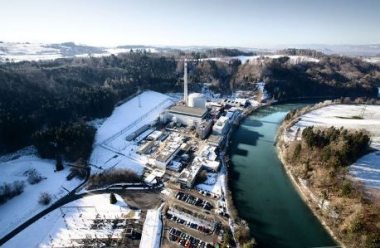A Green-led initiative to enshrine nuclear phaseout plans in Swiss law has secured enough support to force a public vote on the issue. Nuclear supporters say the move would needlessly jeopardise energy security.
 |
| BKW's Muhleberg has just celebrated 40 years of operation on 6 November (Image: BKW) |
An alliance of environmental groups, political parties, anti-nuclear organisations and trade unions including the Green Party and Greenpeace Switzerland claims to have secured 125,000 signatures in support of the initiative it filed at Switzerland's Federal Chancellery. This is in excess of the 100,000 supporters needed under Swiss constitutional law for an initiative to be put to a referendum. Regula Rytz, co-president of the Swiss Green Party, said the alliance was "delighted" its demands had found such "broad support".
Switzerland's federal government has already decided to phase out the five nuclear reactors which generate 40% of the country's electricity by not replacing them with new nuclear capacity at the end of their anticipated working lives, in response to the March 2011 Fukushima Daiichi accident in Japan. This would effectively see all of Switzerland's nuclear power plants shut by 2035. The Green alliance seeks to impose a statutory limit of 45 years on the operating lives of the country's nuclear power plants and a ban on new construction, which would result in Swiss nuclear power being phased out by 2029.
Not justified
The high standards of Swiss nuclear safety, coupled with existing legal requirements that nuclear plants can only continue to operate provided their safety can be guaranteed, mean that the Green initiative is not justified according to the Swiss Nuclear Forum. In a statement, the organisation pointed to a culture of continuous safety improvements within the Swiss nuclear power industry, with security levels at Swiss plants shown by post-Fukushima tests to be above international standards.
"To renounce nuclear purely on a political decision would further jeopardise our security of supply," the organisation said.
A strategy for Swiss energy to 2050 drawn up by the country's Department of the Environment, Transport, Energy and Communication (DETEC), currently undergoing public consultation, foresees expanded use of renewables and hydro power but anticipates increased reliance on fossil fuels and electricity imports as an interim measure. DETEC has already estimated that phasing out nuclear energy will cost it around CHF 30 billion ($33 billion) by 2050.
Researched and written
by World Nuclear News






_15863.jpg)







